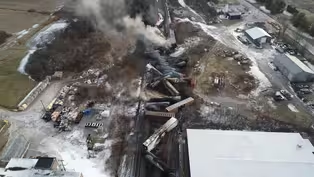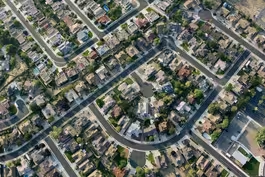
Thousands protest Israeli plan to weaken nation's judiciary
Clip: 2/13/2023 | 7m 38sVideo has Closed Captions
Thousands in Israel protest far-right government's plan to weaken nation's judiciary
The recently elected far-right government in Israel took a clear step Monday toward passing highly controversial judicial reform. Its actions have created a massive reaction among Israelis who stand against it, saying they could fundamentally alter Israel's democracy. William Brangham discussed the latest with David Makovsky of the Washington Institute for Near East Policy.
Problems playing video? | Closed Captioning Feedback
Problems playing video? | Closed Captioning Feedback
Major corporate funding for the PBS News Hour is provided by BDO, BNSF, Consumer Cellular, American Cruise Lines, and Raymond James. Funding for the PBS NewsHour Weekend is provided by...

Thousands protest Israeli plan to weaken nation's judiciary
Clip: 2/13/2023 | 7m 38sVideo has Closed Captions
The recently elected far-right government in Israel took a clear step Monday toward passing highly controversial judicial reform. Its actions have created a massive reaction among Israelis who stand against it, saying they could fundamentally alter Israel's democracy. William Brangham discussed the latest with David Makovsky of the Washington Institute for Near East Policy.
Problems playing video? | Closed Captioning Feedback
How to Watch PBS News Hour
PBS News Hour is available to stream on pbs.org and the free PBS App, available on iPhone, Apple TV, Android TV, Android smartphones, Amazon Fire TV, Amazon Fire Tablet, Roku, Samsung Smart TV, and Vizio.
Providing Support for PBS.org
Learn Moreabout PBS online sponsorshipAMNA NAWAZ: The recently elected far right government in Israel took a clear step today toward passing highly controversial judicial reform, and its actions have created a massive reaction among Israelis who stand against it, saying they could fundamentally alter Israel's democracy.
William Brangham reports.
WILLIAM BRANGHAM: The streets of Jerusalem were flooded today with the largest demonstrations Israel has seen in years.
Protesters thronged outside the Knesset, the Israeli Parliament, following weeks of mounting frustrations and other demonstrations.
The target?
Prime Minister Benjamin Netanyahu and a proposed overhaul of Israel's judicial system.
Netanyahu and his supporters argue the Supreme Court is too powerful and needs to be reined in.
But critics contend these laws badly weaken the court, tighten the prime minister's grip on power, and could spell the downfall of Israeli democracy.
HAIM SHADMI, Protester: These are the crucial days for Israel's future and Israel's identity, whether it's going to be a democracy or a fascist regime.
WILLIAM BRANGHAM: Inside the Knesset, chaos erected as Netanyahu's allies pushed the reform through a committee.
Opposition lawmakers chanted "Shame" at their far right counter parts.
Opposition leader Yair Lapid called for further demonstrations.
YAIR LAPID, Former Israeli Prime Minister (through translator): We will not hide in the houses as they try to turn the state of Israel into a dark dictatorship and shut us up.
They will not shut us up.
WILLIAM BRANGHAM: In comments today, Netanyahu condemned the outbursts.
BENJAMIN NETANYAHU, Israeli Prime Minister (through translator): I call on the leaders of the opposition, stop it.
Stop deliberately dragging the country into anarchy.
Most citizens of Israel don't want anarchy.
They want a substantive dialogue, and, in the end, they want unity.
WILLIAM BRANGHAM: Complicating the issue is that Netanyahu is currently facing corruption charges, charges he denies, but, legally, he stands to gain from the law's passage.
His office would have more control over judicial appointments and less checks on its executive powers.
Despite the mass protests, Israelis are closely divided over these reforms; 41 percent are against and roughly 44 percent support.
Last night, Isaac Herzog, Israel's president, which is largely a ceremonial role, appealed for dialogue and compromise, but warned of potentially disastrous outcomes.
ISAAC HERZOG, Israeli President (through translator): We are long past being in a political argument.
Rather, we are on the brink of constitutional and social collapse.
WILLIAM BRANGHAM: The legislation now heads to the full Parliament for a series of votes that are likely to stretch on for weeks.
For more on this, we are joined by David Makovsky.
He is the director of the Project on Arabs-Israel Relations at the Washington Institute for Near East Policy.
And, previously, he served as a senior adviser on Israeli-Palestinian negotiations during the Obama administration.
David, great to have you back on the "NewsHour."
As I mentioned, these are the biggest protests that Israel has seen in years.
And critics are arguing, look, if these reforms go through, this so dramatically up ends the balance of power in the country that it will become almost unrecognizable.
Is that a fair characterization?
DAVID MAKOVSKY, Senior Fellow, Washington Institute for Near East Policy: I think it's more accurate than not, because, basically, it would concentrate the power in the hands of the executive.
But Israel always had this independence of the judiciary that was its pride and joy.
It would -- it was part of its social cohesion, its resilience all these years that it had a check on executive power.
But if you're able to politicize the judges, if you're able to have a bare majority of the Parliament able to override a Supreme Court decision, what you're going to see over time is the evisceration of that independent judiciary, which has had pride of place in Israel for the 75 years of its existence.
WILLIAM BRANGHAM: I mean, Netanyahu and his supporters argue that the Supreme Court is too liberal, that it has too much power, and that their reforms are what get it closer to a more equitable distribution of power.
Where do you come down on that?
DAVID MAKOVSKY: I think that's not a fair characterization.
There will be times they will cherry-pick certain points of well, oh, in America, the Senate Judiciary Committee has a hearing.
But the United States, we have protections that Israel doesn't have.
We have a Constitution.
If there's an amendment, it requires three-quarters of the states.
We have two branches of Congress.
We have term limits.
Israel doesn't have any of those things.
So what you're going to see is that those protections that Israel not have are now going to be weakened further by politicizing who gets on the courts through the selection committee and how they're able to override court decisions with ease.
So, I -- the critics are worried that the very identity of the state is at stake.
It will still be a democracy, in the sense of the election.
But democracy is more than elections.
WILLIAM BRANGHAM: We can't overlook the fact that Netanyahu is under indictment, and other members of his coalition have very strong disagreements with this court.
Is it inappropriate to look at these reforms through that lens?
DAVID MAKOVSKY: I think it's very fair to look at it.
It's a perfect storm, what's going on.
Basically, you have a situation, as you pointed out, the prime minister is in the middle of a corruption trial on three charges.
You have got the Ultra-Orthodox.
They're mad at the courts because the courts want to always ensure that they are not exempt from the draft.
There's a three-year military conscription.
And, also, the settler constituency is upset at the courts because they feel that they are a constraint, a break on settlements in terms of Palestinian land usage and the like.
So, every element of the Netanyahu coalition has its own individuals grievance.
And now it's kind of coming to a crescendo, where all these individual grievances are becoming a collective grievance.
And that is causing them to want Netanyahu to stand tough against the 100,000 demonstrators who are coming against it every week.
But it's not just 100,000.
The point is that the polls do show that a majority of the Israelis want consensus.
And now you have the Israeli president.
He's come out with his own principles that he feels could forge the very consensus that has not been chosen.
But I think there's a sense in Israel that there's a fraying of the social fabric, that the very social cohesion that has been at the core of Israel and allowed it to fight against its enemies when it felt threatened for these 75 years, that is fraying.
And that is something that the United States cares deeply about, because these are two countries that have been joined by common interests and also common values.
And if those common values are now imperiled, that's something the United States cares about.
WILLIAM BRANGHAM: All right, David Makovsky of the Washington Institute for Near East Policy, great to see you.
Thank you.
DAVID MAKOVSKY: Great to be with you.
Museum of Lost Memories helps connect mementos with owners
Video has Closed Captions
Clip: 2/13/2023 | 6m 52s | Museum of Lost Memories helps reunite misplaced family mementos with their owners (6m 52s)
Rebel-held areas of Syria left without earthquake aid
Video has Closed Captions
Clip: 2/13/2023 | 7m 16s | Earthquake victims in rebel-held area of Syria left without aid, rescue operations (7m 16s)
Release of toxic chemicals prompts broader safety concerns
Video has Closed Captions
Clip: 2/13/2023 | 7m 11s | Release of toxic chemicals from train derailment in Ohio prompts broader safety concerns (7m 11s)
Sharp rise in deaths among pregnant women and new mothers
Video has Closed Captions
Clip: 2/13/2023 | 5m 14s | What's behind a sharp rise in deaths among pregnant women and new mothers? (5m 14s)
U.S. reveals new details about flying objects
Video has Closed Captions
Clip: 2/13/2023 | 5m 36s | U.S. reveals new details about flying objects and decision to shoot them down (5m 36s)
Victims found alive in rubble a week after earthquake
Video has Closed Captions
Clip: 2/13/2023 | 2m 52s | Victims found alive in rubble a week after earthquake that killed 37,000 in Turkey, Syria (2m 52s)
White House outlines plan to address soaring rent prices
Video has Closed Captions
Clip: 2/13/2023 | 6m 13s | White House outlines plan to address nation's soaring rent prices and protect tenants (6m 13s)
Providing Support for PBS.org
Learn Moreabout PBS online sponsorship
- News and Public Affairs

FRONTLINE is investigative journalism that questions, explains and changes our world.

- News and Public Affairs

Amanpour and Company features conversations with leaders and decision makers.












Support for PBS provided by:
Major corporate funding for the PBS News Hour is provided by BDO, BNSF, Consumer Cellular, American Cruise Lines, and Raymond James. Funding for the PBS NewsHour Weekend is provided by...






